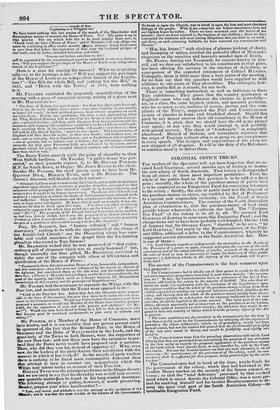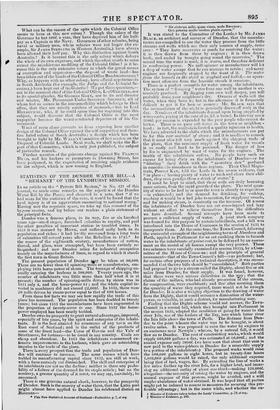COLONIAL OFFICE TRICKS.
THE readers of the Spectator will not have forgotten that we ac- cused Lord GLENELG, several months ago, of wishing to destroy
the new colony of South Australia. That colony is distinguished from all others in three most important particulars. First, the whole of the public land in this province is to be sold at a fixed
price; secondly, the whole of the purchase-money of public land is to be employed as an Emigration Fund for conveying labourers to the colony ; thirdly, the sale of public land and the disposal of the purchase-money as above, are confided by Act of Parliament to a special and responsible authority, viz. the Board of South Australian Commissioners. The essence of the South Australian plan of colonization is, that time purchase-money of land shall provide labour wherewith to cultivate the land. The " Emigra- tion Fund" of the colony is its all in all. We accused Lord GLENELG of desiring to seize upon this Emigration Fund ; and the charge turns out to have been perfectly well-founded. On the 11th of January last, Sir GEORGE GREY, " directed," as ha sacs, " by Lord GLENELG," but really by the Bumbureaucracy of the Colo- nial Office, addressed a letter to the Commissioners, whereby he suggested several alterations in the South Australian Act. Here is one of them- " 3. Lord Glenelg regards as indispensable the reservation to the Lords of the Treasury of a power to apply, towards defraying the expense of the civil government and of the administration of justice, so much of the proceeds of the sales of land as may he necessary to supply the deficiency of other public resources ; a deficiency which, in the infancy .1 the settlement, will be pro- bably total."
The answer of the Commissioners is the best comment upon this proposal-
" The Commissioners feel it wholly out of their power to accede to the third and most important proposition contained in your letter, namely, the reserva- tion, &e.' In fact, the Commissioners have, in pursuance of the Act of Par- liament, sold land in the colony to the amount of 35,0001. The sales thus ef- fected are made (in conformity with the intentions of the Legislature) upon the express condition that the whole of the purchase.moncy arising from them shall be expended in sending out emigrant labourers and their families to the colony, and likewise that the whole of the purchase-money arising from future A sales, subject possibly to a deduction for the expenses incidental to the su vet's and sales, should be applied in the same manner. The latter part of the con- dition, although apparently not so important to the purchasers as the former, is, in fact, quite as essential to their security ; for otherwise they would be ex- posed to that very scarcity of labour which it is the primary object of the Act to prevent. " The same conditions are also involved in the arrangements for the loan [a loan then actually made by the Commissioners for defraying all the expenses of governing the infant settlement], which, in all probability, would not have been advanced, bad not the lenders felt assured that the fundamental principles of the Act were sound in theory, and would be faithfully and rigidly ad- hered to. " The Commissioners trust that the preceding observations will satisfy Lord Olenelg that they are precluded from entertaining the question of any alteration in the Act, ao far as regards the proposed application of the purchase-money of the lauds which have already been, or may hereafter be, sold by the Corn- mis.ioners. Nor can the Commissioners see that any such alteration is at all necessary ; the maintenance of the government of the colony, until its own resources shall be sufficient for that purpose, being provided for by the e.vist- ing law." The Commissioners bad in hand at the time, ample funds for the government of the colony, which they had borrowed in the London Money-market on the security of the future colonial re- venue ; so that the " total deficiency" presumed by that crooked mind which in secret directs the Colonial Office, was a mere pre- text for enabling himself and his brother Burnbureaucrats to de- stroy the most vital part of the South Australian Colony—its invaluable Emigration Fund.
What can be the reason of the spite which the Colonial Office seems to have at this new colony ? Though the salary of the
Governor be but 8001. a year, they have deprived him of his half- pay as a Captain in the Navy. Governors of other colonies, being naval or military men, whose salaries were not larger (fur ex- ample, Sir JAMES STERLING in Western Australia,) have always been allowed their half pay. Why this distinction against South Australia ? Is it because this is the only colony which defrays the whole of its own expenses, and which therefore avoids to some extent the mischievous meddling of the Colonial Office? is it be- cause this is the only extensive colony in which the grand means of corruption and oppression—the disposal of waste land—has been taken out of the hands of the Colonial Office Bumbureaueracy Why, as happens with no other colony, have official appointments in South Australia (for example, the Judge and the Colonial Se- cretary,) been kept out of theGazette? We put these questions,— not to the nominal chief of the Colonial Office, LuudGLENEeG, nor to its special-pleader, Sir GEORGE GREY, nor to its real director and master, Mr. Permanent-Under-Secretary STEPHEN, all of whom feel so secure in the irresponsibility which belongs to their office, that they are utterly careless of reproach,—but to Lord MELBOURNE, who, if he could spare time for inquiring into this subject, would discover that the Colonial Office is the most unpopular because the worst-conducted department of his Go- vernment.
Want of room alone prevents us from exposing here another design of the Colonial Office against the self-supporting and there- fore hated colony of South Australia; a design which has been brought to light by Mr. WARD's Cenunittee of last session on the Disposal of Colonial Lands. Next week, we shall make the Re- port of that Committee, which is only just published, the subject of particular remark.
Further mention of the grievous charge against Sir FRANCIS Men, and his backers or prompters in Downing Street, has been postponed, in the expectation of receiving ample evidence on the subject, which is now coming to England.



























 Previous page
Previous page